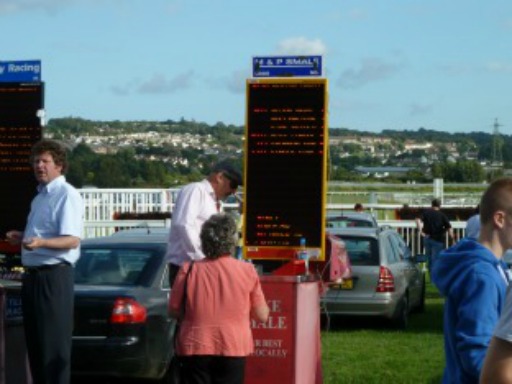How Do Betting Odds Work?
 Gulfstream Park US
Gulfstream Park USTo the question "how do betting odds work?", check out our ultimate guide to betting on horses.
Take a winning approach to betting on the horses. Follow these six essential betting strategies to transform your horse racing picks from no-hopers to potential profit makers.
How do betting odds work using a bet calculator?
Seek the value bet
So you already know that the higher odds the greater the risk a bet won’t win. Very low odds are set for a reason - the likely winner may be a near certainty. However, a value bet is one that returns a higher probability of success than the bookie expects and the odds it advertises for the win.
In simple terms, there are two ways to identify a bet that you feel has potential value.
First, use The Bet Calculator to work out what potential returns you will receive from a certain stake and different types of bets.
Second, assess the implied probability of your wager winning. To do this, use the following for an example where a bet is rated at 5/2 (fractional odds) or 5.50 (decimal odds):
- Denominator / (denominator + numerator) * 100 = implied probability
- 2 / (5 + 2) * 100 = 18.1%
- (1/ decimal odds) * 100 = implied probability
- 1 / (5.50) * 100 = 18.1%
Judging whether your stake and potential returns on this bet are worth the associated probability (18.1% calculated likelihood of success) and risk (81.9% calculated of a loss) provides you with better insight than ‘hoping for the best’.
 On Course Bookmakers
On Course BookmakersThe favourite doesn’t always win
It can be tempting to eye the odds for a favourite and assume the price on them winning is short because the bookies and punters alike must seriously rate their chances.
However, favourites only cross the line first in around a third of the races run. That means you will need to look beyond the horse with the lowest odds in approximately 70% of races to back a winner.
Peruse the previews for promising ponies
There’s a lot of horse racing tipsters about. Many of them are incredibly knowledgeable and their previews can be scanned for insight. Also, given the vast array of horse racing data available for previous meetings, look out for sites that have done the analysis for you and identified trends.
Watch videos of how a horse performs at the course - for example the Grand National course at Aintree.
Acquaint yourself with the key personnel
Just as important as the horse you’re eyeing in the betting markets is its jockey and its trainer.
Certain courses suit certain jockeys and often the best have a pick of horses to ride so the best performers will be sat atop a certain steed for a good reason.
Likewise, some trainers perform remarkably consistently at certain tracks so check out their history for evidence of trends.
Firm up your knowledge of surfaces
Just as jockeys and yards perform well at certain courses, so do certain horses. Some horses perform well on dry and firm ground while some race better than the rest of the field on wet, soft surfaces or all-weather tracks.
Start to follow the trends once the ‘going’ (ground condition) for the course has been confirmed.
Start Strategising - spread your bets
Lumping all of your allocated bankrolls on a chosen horse and hoping for the best isn’t a good betting strategy. You’re more likely to get a return by backing a variety of picks in different races.
Part of the pleasure of taking in a day’s racing and selecting your bets is studying the race cards and digesting form guides and tipster’s ratings.
Once you’re underway in your race to make a profit, dip your toe into a few horse racing betting strategies.
There are lots of guides out there so see if you can find one that makes sense to you and shows promise for returning winners.
This should give you a fair idea of how do betting odds work but if you have any questions just Contact Us
Return to Betting Management from How Do Betting Odds Work
Join my followers of the Horses To Follow (12.5 pts profit in just 10 advised horses this month). You will receive by email all my horses to follow for just £5 per month.
To subscribe just click the Paypal link below

You Might Like These
Kentucky Derby Odds: Will there be a hometown favorite?
Preakness Stakes Odds: Will the champions face fresh challengers?
Belmont Stakes Odds: At 1½ miles, stamina becomes the great equalizer as longshots can threaten.
Breeders' Cup Odds: International talent collides with American speed, reshuffling expectations across the board.
Dubai World Cup Odds: Under desert lights, can a Japanese sensation prevail against the world's elite.
Pegasus Cup Odds: Retirement beckons for champions seeking one final payday at America's richest race.
Bet on Horses: Every wager tells a story of hope against mathematical probability.
Kentucky Derby Betting: Beneath fancy hats and mint juleps, fortunes change hands with each thundering hoof.
Preakness Stakes Betting: The middle jewel rewards those who recognize when Derby form holds true.
Belmont Stakes Betting: Distance separates champions from pretenders when the final furlong tests them all.
Breeders Cup Betting: Global racing converges for two days where value hides in plain sight.

Returns Policy: Once a customer has agreed to pay for a product or service no returns will be permitted or payments returned.
All PayPal transactions are subject to the PayPal Privacy Policy
Privacy Policy: Personal details provided to this site by an individual may be shared with third parties unless requested otherwise.
Above policies updated 15 March 2018





